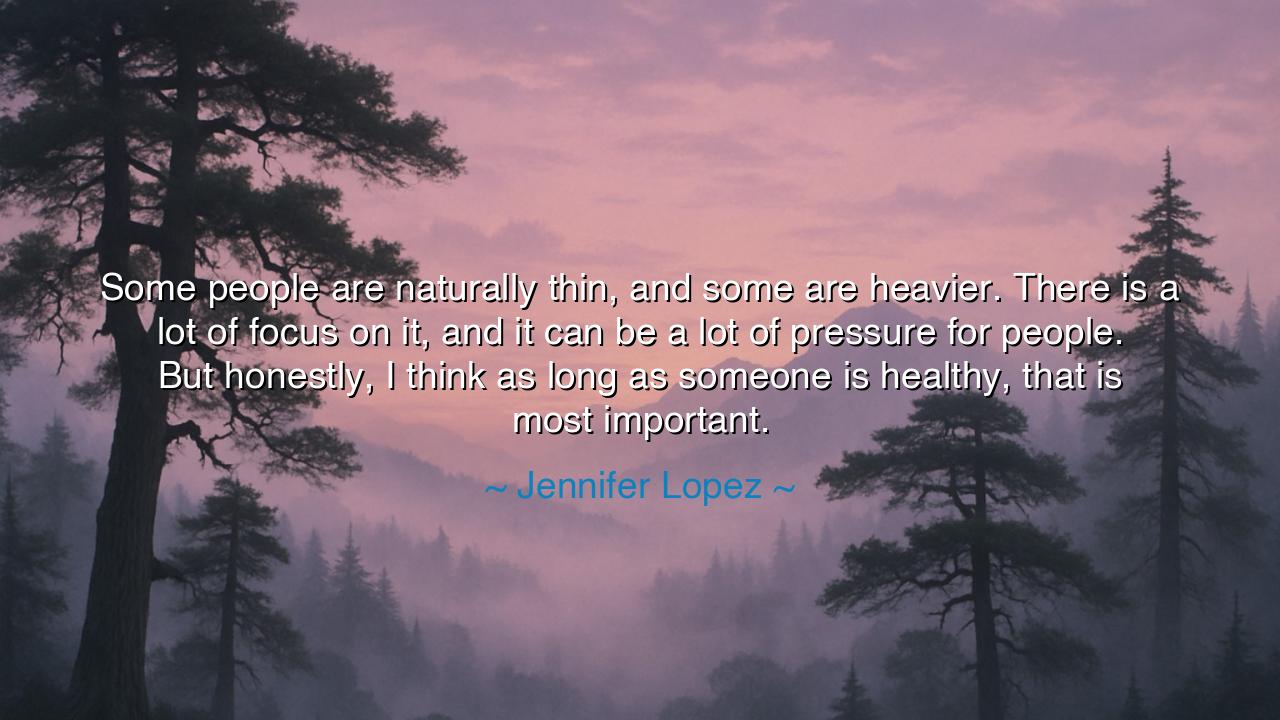
Some people are naturally thin, and some are heavier. There is a
Some people are naturally thin, and some are heavier. There is a lot of focus on it, and it can be a lot of pressure for people. But honestly, I think as long as someone is healthy, that is most important.






The words of Jennifer Lopez, “Some people are naturally thin, and some are heavier. There is a lot of focus on it, and it can be a lot of pressure for people. But honestly, I think as long as someone is healthy, that is most important,” speak with the gentle firmness of a timeless truth. Beneath their simplicity lies a profound understanding of human dignity, self-acceptance, and the false idols of appearance that modern culture has built. In these words, Lopez becomes not merely a voice of beauty, but of balance — reminding us that true health is not measured by the mirror, but by the harmony between body, mind, and spirit.
The origin of this quote reflects Lopez’s own journey through the spotlight — a woman whose image has been scrutinized, praised, and judged for decades. As an artist, actress, and icon of strength, she has lived within the intense glare of public expectation, where every curve and contour becomes a subject of commentary. Yet rather than bow to that pressure, she transformed it into wisdom. Her words are not only for those who battle with body image, but for all who have felt the weight of comparison — the ancient human tendency to measure worth by external form rather than internal wholeness.
In the style of the ancients, one might say that Lopez’s message is a reminder of the golden mean — the Aristotelian ideal of balance. The Greeks, who worshiped beauty, also knew that beauty without virtue, and strength without serenity, were hollow pursuits. To be healthy is to be in balance: between indulgence and deprivation, between vanity and neglect, between ambition and peace. The body, they taught, is the vessel of the soul; it must be honored, not worshiped. Lopez, in her own way, restores this ancient wisdom to a modern world drowning in extremes — where people starve themselves to meet ideals, or abandon self-care in despair.
History offers us radiant examples of those who have embodied this harmony. Consider Audrey Hepburn, whose slender frame became a global symbol of elegance, yet who spent her later life fighting for children’s health through UNICEF. When asked about beauty, she once said that it comes not from the body but from compassion. On the other hand, the legendary opera singer Luciano Pavarotti, large in form but vast in vitality, filled the world with his voice and joy. Both lived differently in body, yet both were the same in spirit — alive, generous, and whole. Their greatness did not depend on size, but on health of the soul, the vitality of the heart, and the peace of one’s inner world.
Lopez’s words also reveal a quiet defiance against the tyranny of perfection — a tyranny that enslaves countless minds. In every age, society has tried to define what is beautiful: from the rounded goddesses of ancient sculpture to the fragile figures of modern fashion. Yet in truth, beauty has never been a number on a scale or a line of symmetry; it has always been the radiant energy of those who live in alignment with themselves. Health, in its deepest sense, is that alignment — when the heart, the body, and the mind sing the same song. “As long as someone is healthy,” Lopez says, “that is most important.” This is not indulgence, but wisdom — for no one can pour from an empty vessel, and no one can glow with peace while at war with their reflection.
There is a quiet heroism in her statement. It takes courage to stand in a world obsessed with appearance and declare that worth lies beyond it. To live this truth is to resist the noise, to trust the rhythms of one’s own nature. The thin and the full-bodied, the tall and the short — each shape is a different note in the symphony of humanity. Health is the melody that unites them all. The ancients would have called it arete — excellence, not in one form, but in the harmonious fulfillment of one’s potential. When a person lives healthily — in strength, gratitude, and joy — their body, whatever its form, becomes beautiful because it radiates truth.
The lesson of Jennifer Lopez’s words is both tender and profound: care for your health, not your image. Eat to nourish, move to feel alive, rest to restore, and think with kindness toward yourself. Let go of comparison, for no two souls are shaped alike. The tree that grows straight beside the one that bends is no less worthy of sunlight. Health, not perfection, is the true crown of human life — for from it flows clarity, creativity, compassion, and peace.
So let these words be remembered as a teaching for all generations: the beauty of a person lies not in symmetry or scale, but in vitality and harmony. The strong heart, the calm mind, the grateful spirit — these are the true jewels of humanity. Be neither ashamed of your form nor enslaved by it. Instead, honor it, care for it, and let it be the faithful servant of your soul. For as long as you are healthy — in body and in heart — you carry within you the greatest beauty of all: the beauty of being fully, joyfully alive.






AAdministratorAdministrator
Welcome, honored guests. Please leave a comment, we will respond soon